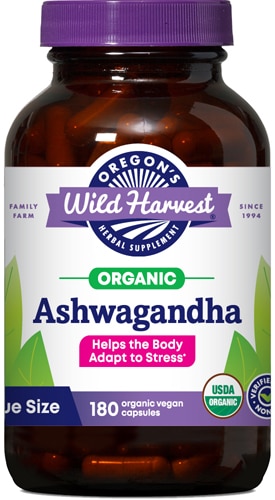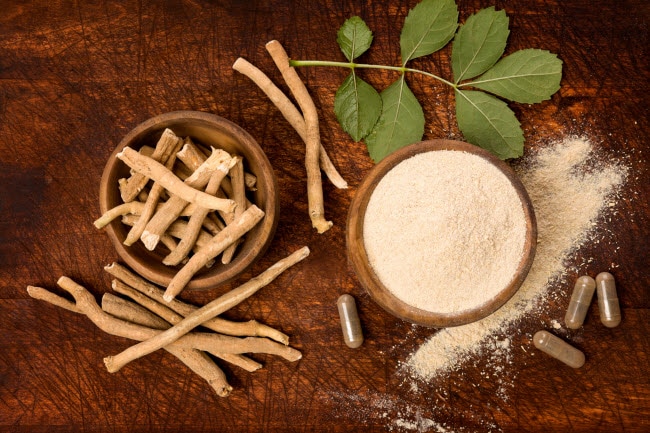Ashwagandha, long revered in Ayurveda, a traditional system of medicine practiced in India, is suddenly popping up everywhere in the West, in smoothie boosts, protein powders, bars and supplements. The root smells like horse (“ashwa” is Sanskrit for horse) and it is believed to endow people who take it with the power and virility of a horse. But what exactly does it do?
What is ashwagandha?
Ashwagandha is part of a larger class of adaptogenic herbs recently finding favor with the wellness crowd. Adaptogens are believed to adapt to your body’s needs, balancing energy levels, for example, if too high or low, and protecting your body from the toll of stress.
Ashwagandha, also known as Indian ginseng (although similar only in terms of benefits), is a hallmark Ayurvedic herb and considered a tonic with multiple properties. Its health benefits are linked to its high concentration of withanolides, considered the biologically active components of ashwagandha.
What are some ashwagandha health benefits?
Ashwagandha is often used in supplement formulations for stress and mood. It is also used as a general tonic, to support energy levels, adrenal function, libido, health and longevity. Several small studies indicate ashwagandha supplements may be helpful for anxiety and stress, but more research is needed.
Are there specific ashwagandha benefits for women?
Because of its effect on stress reduction, some studies suggest a potential for ashwagandha to support women’s reproductive health. One small, recent study demonstrated that oral administration of ashwagandha may support sexual function in healthy women.
How about ashwagandha benefits for men?
Ashwagandha has traditionally been used to support strength, sexual health and performance in men, and sexual health in both men and women. In one 3-month study in 75 men experiencing infertility, five grams of ashwagandha daily supported sperm count and motility. Another study suggested the herb’s potential to improve cognitive and physical performance. In a 2014 study, healthy men given 500 mg of ashwagandha per day for two weeks performed significantly better on tests for task performance and reaction time, compared to those given a placebo.†
Are there ashwagandha side effects?
Although generally ashwagandha is well-tolerated, mild to moderate side effects such as headache, sleepiness and stomach upset have been reported in clinical studies. Rare cases of elevated liver enzymes and liver injury, allergic reactions, and rapid heartbeat have been noted. Consumers should be aware that ashwagandha can potentially lower blood pressure and blood sugar and increase thyroid hormone levels.
Is ashwagandha safe?
For most people, ashwagandha is considered a safe herb to take on a long-term daily basis. It’s always prudent, however, to consult your doctor before starting. There are three known red flags when it comes to taking ashwagandha:
- If you have hormone-sensitive prostate cancer: Ashwagandha may increase testosterone levels.
- If you take benzodiazepines, anticonvulsants or barbiturates: Lab and animal studies suggest ashwagandha may also have both sedative and central nervous system effects.
- If you are pregnant: Ashwagandha may induce abortion at higher doses, so pregnant women should not use it.
How much ashwagandha should I take?
Based on factors like your current health, age, and the nature of your issues, ashwagandha dosage recommendations can vary. When it comes to all herbal remedies, it’s best to start with moderation—low and slow. Dosages vary depending on your specific needs, but 250 to 500 mg per day for at least one month seems to be a reasonable starting point.
What’s the best time to take ashwagandha?
You can take it at any time of day.
What should I look for in an ashwagandha supplement?
You can look for organic and non-GMO, of course. Make sure the ashwagandha is manufactured by a reputable company, as a 2014 study found some ashwagandha products to be contaminated by heavy metals.
Another tip: Some brands list the percentage of withanolides in the product. The withanolide content can help you determine the strength of the product. you want to look at the withanolide content. It should range from 1 percent to 10 percent (some feel that products with at least 2.5 percent withanolides are most effective). A good-quality supplement often includes this information, which ensures you get a product high in withanolides. The higher the withanolide content, the stronger the effects of the supplement.†
†These statements have not been approved by the Food and Drug Administration. These products are not intended to diagnose, treat, cure or prevent disease.




